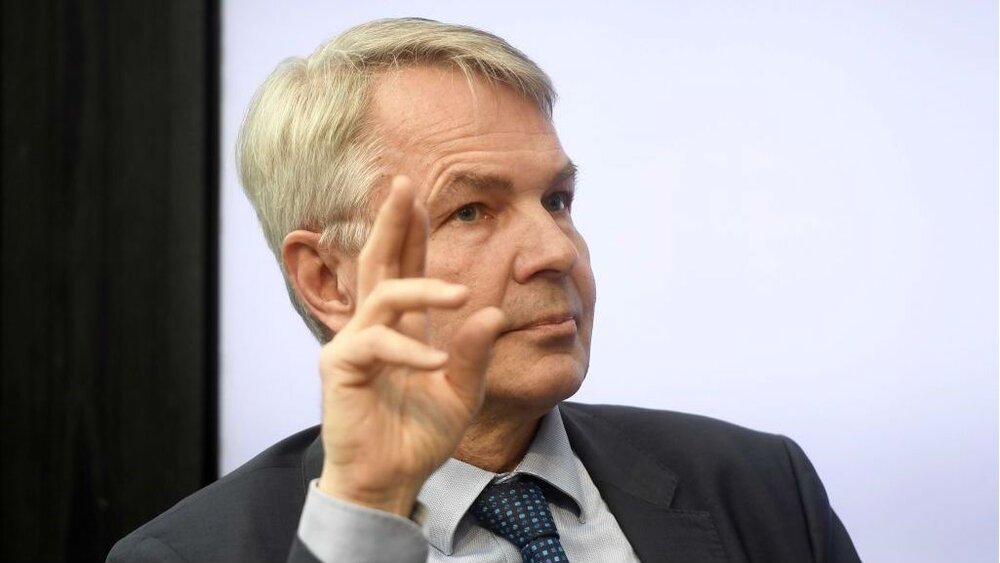Finland says considers nuclear deal as basis for increasing ties

TEHRAN – Finnish Foreign Minister Pekka Haavisto has said that Helsinki considers the 2015 nuclear deal, formally known as the JCPOA, as the cornerstone of expanding ties with Iran.
“We support the JCPOA. We are concerned about the United States’ withdrawal from the deal and also Iran’s steps towards quitting the JCPOA,” he told IRNA in an interview published on Saturday.
Haavisto added, “We consider the JCPOA a good basis for bilateral cooperation. We believe that Europe can help Iran find a way out of the current crisis. Undoubtedly, we should continue dialogue and good relations.”
In May 2018, President Donald Trump abandoned the nuclear deal and returned the previous sanctions and imposed new harsh ones. He even has introduced a total ban on Iran’s oil exports.
On May 8, exactly one year after the U.S. pulled out of the JCPOA, Tehran began reducing its commitments to the agreement at bi-monthly intervals.
In follow-up to that deadline, on July 7 Iran announced that it has started enriching uranium to a higher purity than the 3.67% as the Europeans missed the 60-day deadline to devise a concrete mechanism to protect the country from the U.S. sanctions.
In a letter to European Union foreign policy chief Federica Mogherini on September 5, Foreign Minister Mohammad Javad Zarif also announced that as a third step Iran stops implementing all commitments related to nuclear research and development (R&D).
“The Iranian foreign minister sent a letter to Mogherini, announcing that the Islamic Republic of Iran stops all commitments in the area of research and development under the JCPOA because of consequences of the United States’ withdrawal from the deal and the three European countries’ failure to implement their commitments,” Foreign Ministry spokesman Mousavi said.
The three European countries refers to France, Germany and Britain (E3) which are signatory to the deal.
“In this letter, it has been said that this action is in line with Iran’s rights under the JCPOA and within the paragraph 36 of it, and is in response to violation of the JCPOA during the past 16 months,” Mousavi added.
Iranian President Hassan Rouhani said in a press conference in New York on Thursday that the European countries have either been unable or shown no will to save the nuclear deal.
“We reduced our commitments in two phases. We also started the third phase. We hope that we would reach an agreement by the end of the two-month deadline. We will take the next steps if Europeans are not able to fulfill their duties,” Rouhani pointed out.
“We were living up to our commitments fully and they kept decreasing their commitments. We wanted to create a balance, just as they were decreasing their commitments,” CNN quoted him as saying.
Iran has repeatedly said if the remaining members of the JCPOA protect Tehran from sanctions effects it will immediately reverse its decisions. This statement was again echoed by Rouhani in New York on Thursday.
Foreign Minister Mohammad Javad Zarif said on September 22 that Iran will not succumb to economic pressure by Washington.
“Abandon the illusion that Iran can be defeated by pressure,” he told NPR.
“We are resisting an unprovoked aggression by the United States. I can assure you that the United States will not be able to bring us to our knees through pressure,” he said.
Former U.S. Secretary of State John Kerry has said that Washington’s withdrawal from the nuclear deal is the cause of escalation of tension in the region, calling policy of “maximum pressure” on Tehran bankrupt.
“We have been pressuring them. Maximum pressure. And it was entirely foreseeable that that would result in further conflict. So we’re seeing the unfolding of really a bankruptcy of approach,” he told CBS News.
NA/PA
Leave a Comment